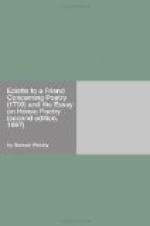The Epistle to a Friend concerning Poetry is here reproduced, with permission, from the copy at Harvard. The “Essay on Heroic Poetry” is reproduced, with permission, from a copy of the 1697 edition of The Life of Our Blessed Lord owned by the Henry E. Huntington Library, at San Marino, California. Our reproduction of the second item was made from a typescript because the printing of the original lacks the size and clarity which are necessary for satisfactory results In lithoprinting. The typescript follows the original accurately except that italics (crazily profuse in the 1697 edition) are omitted, the use of quotation marks is normalized, and three obvious typographical errors are silently emended.
Edward Niles Hooker
AN
EPISTLE
TO A
FRIEND
CONCERNING
POETRY.
By SAMUEL WESLEY.
Fungor vice Cotis.
LONDON
Printed for CHARLES HARPER, at the Flower de Luce in Fleetstreet. MDCC. 25. Aprill.
PREFACE.
I have not much to say of this Poem, before I leave it to the Mercy of the Reader. There’s no need of looking far into it, to find out that the direct Design of a great part of it, is to Serve the Cause of Religion and Virtue; tho’ ’twas necessary for that End to dispose the whole in such a manner as might be agreeable to the Tast of the present Age, and of those who usually give such sort of Books the Reading. If there be any Thoughts in it relating to Poetry, that either are not known to all Persons, or are tolerably ranged and expressed, the Reader is welcome to ’em for Over-weight: If there are too few of these, I yet hope the Pardon of all candid Judges, because I’ve done the best I cou’d on this Argument. I can’t be angry with any Person for ranking me amongst the Ogylbys; my Quarrel is with these that rank themselves amongst Atheists, and impudently defend and propagate that ridiculous Opinion of the Eternity of the World, and a fatal invincible Chain of Things, which, it seems, is now most commonly made use of to destroy the Faith, as our lewd Plays are to corrupt the Morals of the Nation: An Opinion, big with more Absurdities than Transubstantiation it self, and of far more fatal Consequence, if receiv’d and believ’d: For besides its extremely weakening, if not destroying, the Belief of the Being and Providence of God, it utterly takes away any sort of Freedom in Humane Actions, reduces Mankind beneath the Brute Creation; perfectly excuses the greatest Villanies in this World, and entirely vacates all Retribution hereafter. One wou’d wonder with what Face or Conscience such a Sett of Men shou’d hope to be




